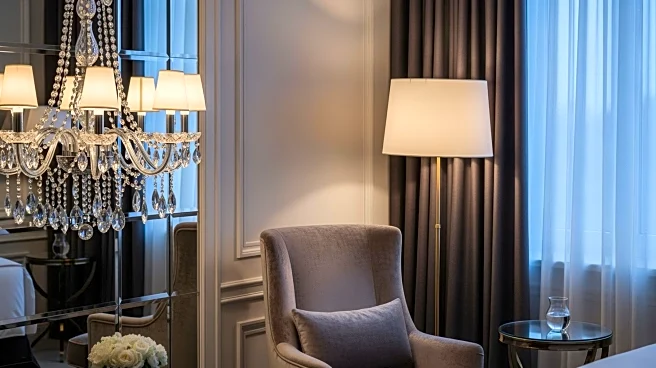What's Happening?
AXIS Architecture + Design has completed a comprehensive renovation of The Ritz-Carlton, Lake Tahoe, a renowned luxury hotel. The project, which spanned several years, involved a complete transformation
of the hotel's key areas, including the lobby, meeting rooms, and the Manzanita restaurant. The renovation aimed to blend the hotel's traditional mountain lodge character with the sophisticated luxury of The Ritz-Carlton brand. Notable features include a reimagined Living Room Lodge, a new Topgolf Swing Suite, and a redesigned lobby bar. The design incorporates natural materials like stone and wood, reflecting the surrounding Sierra Nevada landscape.
Why It's Important?
The renovation of The Ritz-Carlton, Lake Tahoe, positions the hotel as a leading luxury destination in the region, potentially boosting tourism and local economic activity. By enhancing the hotel's amenities and aesthetic appeal, AXIS Architecture + Design has elevated the guest experience, which could attract more visitors and increase occupancy rates. This project also highlights the growing trend in the hospitality industry towards integrating natural elements and sustainable design practices, which can appeal to environmentally conscious travelers.
What's Next?
Following the renovation, The Ritz-Carlton, Lake Tahoe, is expected to attract a higher volume of guests seeking luxury accommodations with a unique mountain lodge experience. The introduction of the Topgolf Swing Suite may also draw visitors interested in interactive entertainment. The hotel's enhanced facilities could lead to increased bookings for events and conferences, further contributing to its revenue and reputation as a premier destination.
Beyond the Headlines
The renovation reflects broader trends in hospitality design, where luxury hotels are increasingly focusing on creating immersive experiences that connect guests with their natural surroundings. This approach not only enhances the aesthetic appeal but also promotes sustainability by using local materials and designs inspired by the environment. Such developments could influence future hotel renovations and new constructions, encouraging a shift towards more eco-friendly and culturally resonant hospitality spaces.











